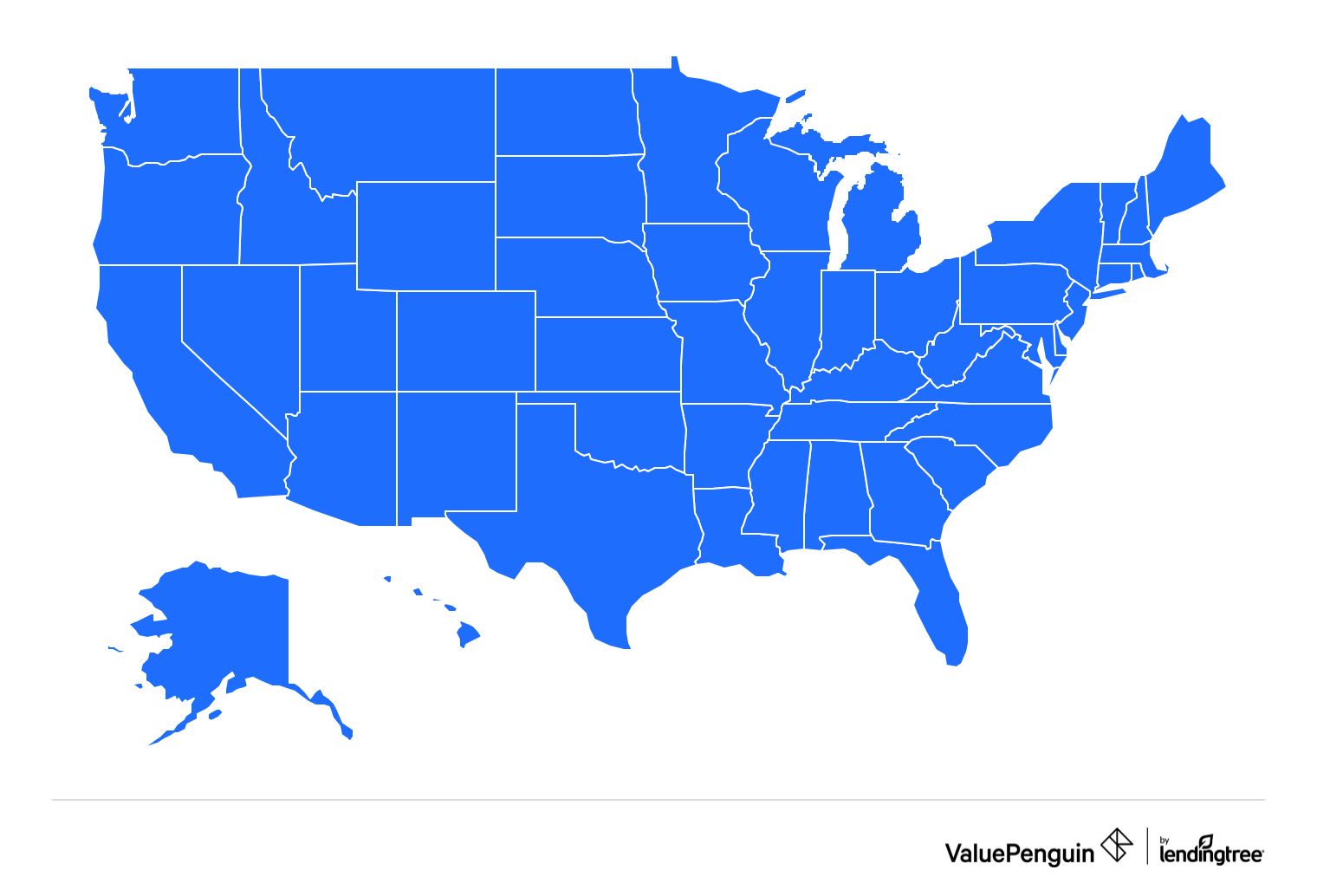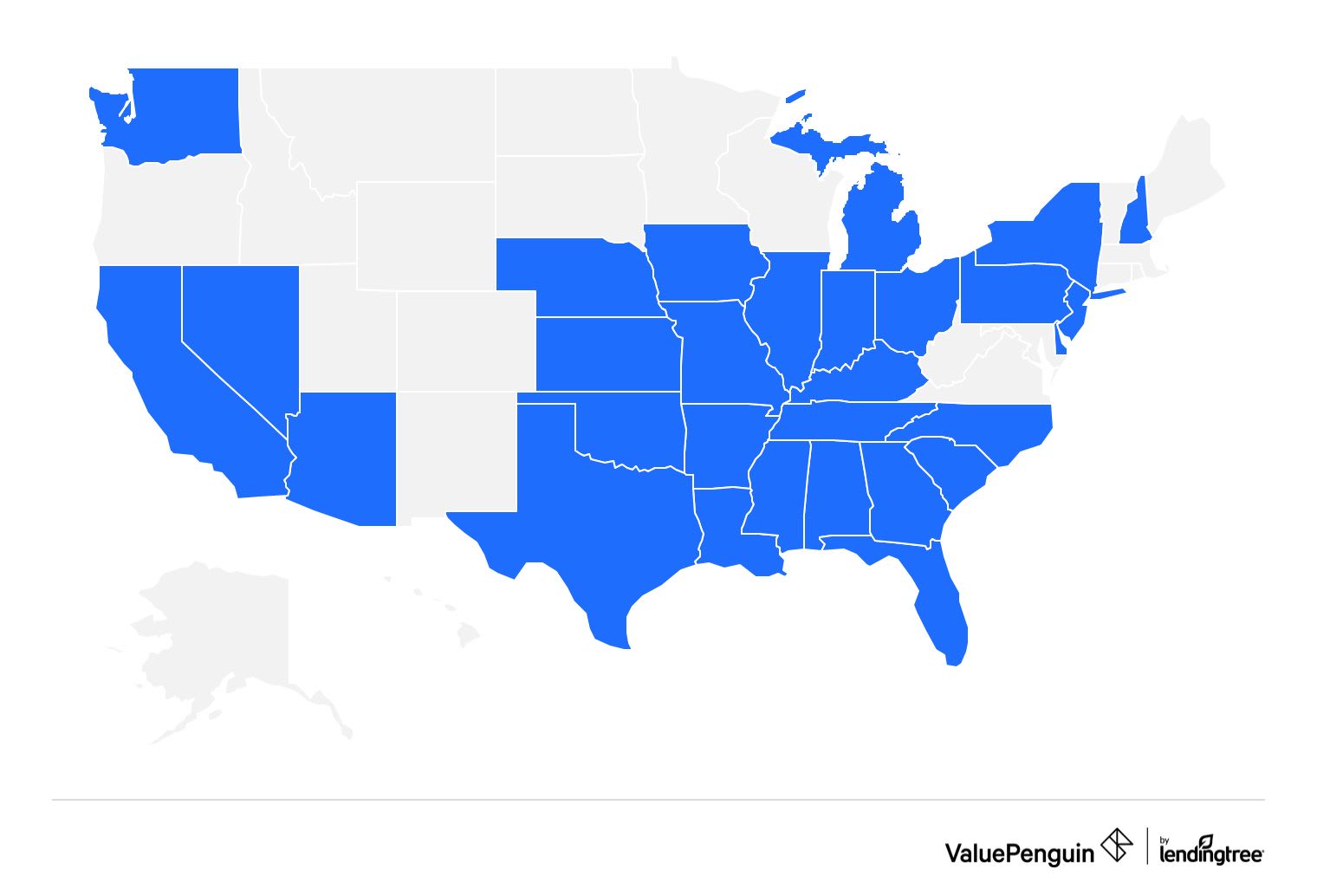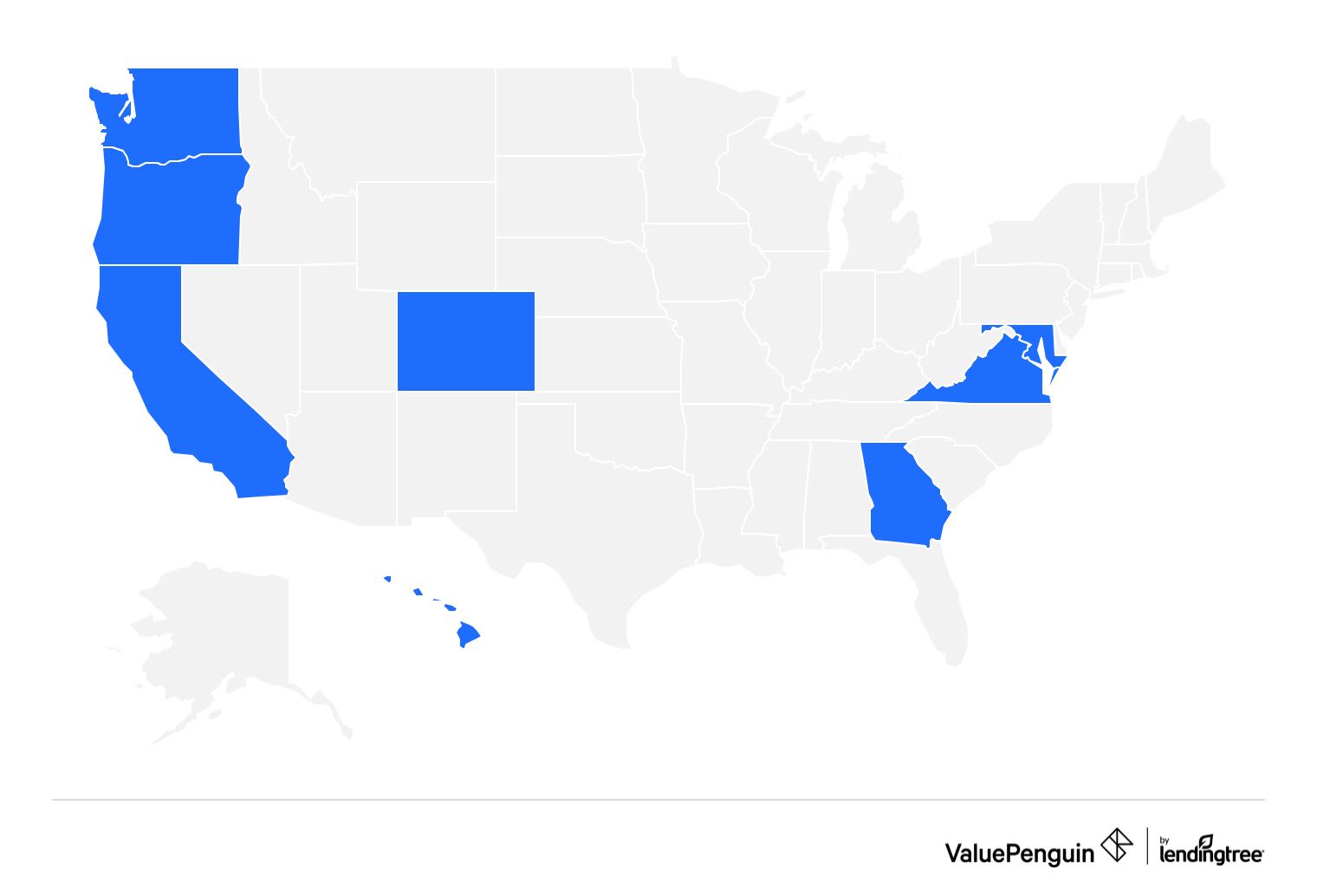Best Health Insurance for Pregnant Women
Blue Cross Blue Shield, Ambetter and Kaiser Permanente have the best health insurance for pregnant women.
Find Cheap Health Insurance Quotes in Your Area
Best Insurance for Pregnancy
The costs for prenatal care, as well as for labor and delivery, can add up quickly. The best health insurance for pregnant women helps you get the care that you and your baby need while reducing what you have to pay.
To find the best companies for pregnancy insurance, ValuePenguin's experts first compared average costs of a Silver plan for a 30-year-old and each company's specific maternity benefits and coverage. The size of each company's provider network is also an important metric because a larger network makes it easier to get care. Customer service reviews were used to determine how satisfied people were with their plans.
Best health insurance for pregnant women
Blue Cross Blue Shield has the best health insurance for pregnant women because of its maternity programs and range of in-network doctors.
Ambetter is a good option if you need cheap maternity insurance because it's one of the cheapest options in most states. Kaiser Permanente has the best customer service, but you can only get it in eight states and Washington, D.C.
Health insurance company | Best for | Monthly cost* | |
|---|---|---|---|
| Kaiser Permanente | Customer service | $442 | |
| Ambetter | Cheap plans | $464 | |
| Blue Cross Blue Shield | Best overall | $565 | |
*Average monthly cost for a 30-year-old with a Silver plan
Find Cheap Health Insurance in Your Area
Women with standard pregnancies might need up to 15 prenatal doctor appointments during pregnancy. High-risk pregnancies can result in even more appointments. Having good insurance during your pregnancy can help you avoid high out-of-pocket costs.
Blue Cross Blue Shield (BCBS): Best overall pregnancy insurance
-
Editor's rating
- Cost: $565/month
Blue Cross Blue Shield has helpful maternity programs and large network of doctors.
Pros:
-
Most doctors and hospitals take BCBS
-
Good maternity programs
-
Available nationwide
Cons:
-
High average rates
-
Coverage depends on where you live
Most doctors and hospitals accept Blue Cross Blue Shield insurance, so it's a great option for most women. Several Blue Cross Blue Shield companies have programs designed specifically for the needs of pregnant women.
For example, Blue Cross Blue Shield of Alabama has a program called Baby Yourself. The program pairs expectant mothers with a personal nurse to help guide them through their pregnancies. Participating women also can access an app to help them keep track of pregnancy symptoms and stay organized with appointments, like ultrasounds and sonograms.
In addition to providing pregnancy insurance programs for mothers, Blue Cross Blue Shield supports community programs that improve maternal health. The Elevance Health Foundation, which is part of Blue Cross Blue Shield, has pledged to give $30 million to programs that work to reduce premature birth rates, lower the risk of pregnancy complications and death, and reduce the need for first-time C-sections.
Over 90% of the doctors and hospitals in the United States accept Blue Cross Blue Shield insurance, which makes it easier for pregnant women to find prenatal care close to them. Keep in mind that Blue Cross Blue Shield is made up of independent regional companies, so coverage offerings vary.

Blue Cross Blue Shield sells health insurance in every state and Washington, D.C.
Ambetter: Cheapest pregnancy insurance plans for most people
-
Editor's rating
- Cost: $464/month
Ambetter has the cheapest maternity insurance for most people.
Pros:
-
Cheap rates
-
Available in 29 states
-
Extra support during pregnancy and postpartum
Cons:
-
Not available nationwide
-
Not all doctors take Ambetter
Ambetter sells cheap health insurance in many states, making it a great option if you're on a budget.
Ambetter also has a good maternity program called Smart Start for Your Baby, which provides information and support for pregnancy, delivery and postpartum. The program can help you find a doctor that fits your needs, teach you about your baby's different stages of development and help you recover after your baby is born.
But some people have trouble finding in-network doctors with Ambetter. Before you buy a plan, call your doctors and hospitals you think you may use during your pregnancy and make sure they take Ambetter insurance.
Ambetter sells health insurance in 29 states.

- Alabama
- Arizona
- Arkansas
- California
- Delaware
- Florida
- Georgia
- Illinois
- Indiana
- Iowa
- Kansas
- Kentucky
- Louisiana
- Michigan
- Mississippi
- Missouri
- Nebraska
- Nevada
- New Hampshire
- New Jersey
- New York
- North Carolina
- Ohio
- Oklahoma
- Pennsylvania
- South Carolina
- Tennessee
- Texas
- Washington
Kaiser Permanente: Best pregnancy insurance for customer service
-
Editor's rating
- Cost: $442/month
Kaiser Permanente has excellent customer service and low average rates.
Pros:
-
Highly rated customer service
-
Cheap rates
-
Plans can help you connect with other parents
Cons:
-
Only in eight states and D.C.
-
Requires you to use Kaiser doctors and hospitals
Kaiser Permanente has cheap rates and excellent customer service. If you live in one of the eight states where Kaiser sells plans, or in Washington, D.C., it could be worth getting a quote.
Kaiser Permanente's health insurance plans sync with its medical offices, which can make paying for health care an easier experience. This contributes to Kaiser Permanente's high customer satisfaction scores, but it also means you have to stay within the Kaiser network of doctors and hospitals unless you have an emergency.
Kaiser Permanente offers a pregnancy program called CenteringPregnancy in most areas. This is a group program that connects you to other mothers with babies due around the same time. CenteringPregnancy helps you learn how to handle pregnancy symptoms, eat healthy, reduce stress, prepare for labor and birth, and more. You'll also form a community with other mothers going through the same things you are.
Kaiser Permanente gives you the option to choose to see either an obstetrician or a certified nurse midwife for your pregnancy care and birth. Most of Kaiser Permanente's obstetricians are board certified, too, which means they've had extra training for maternity care.
Kaiser Permanente sells health insurance plans in eight states and Washington, D.C.

- California
- Colorado
- Georgia
- Hawaii
- Maryland
- Oregon
- Virginia
- Washington
- Washington, D.C.
Find Cheap Health Insurance in Your Area
Other options for pregnancy insurance
There are three main types of health insurance plans that offer the best affordable options for pregnancy: employer-provided coverage, marketplace plans and Medicaid.
The best health insurance for pregnancy will be specific to your circumstances. For example, you might need more or different prenatal care than other mothers, which means your health insurance plan might need to be different.
Employer-sponsored maternity insurance
The simplest health insurance option for most pregnant women is employer-provided coverage. If you or your spouse has health insurance through a job that offers coverage, it's usually the cheapest way to get a policy. Usually, your employer will pay part of your monthly health insurance premium, which keeps rates low.
If you are a minor and you're pregnant, your parent's plan is required to cover your pregnancy care.
Your delivery might be covered, but it depends on your parent's policy. If your parent has health insurance through a small business or an individual health insurance policy, delivery should be covered. If your parent has health insurance from a large company, the plan isn't required to cover your delivery. Some companies will still cover the birth, so you should check with the plan. If you don't have coverage for your delivery, you may want to look into Medicaid or marketplace health insurance to get coverage for your delivery.
In either case, your parent's policy isn't required to cover your baby. You are allowed to stay on a parent's plan until age 26, but you'll need to get a separate policy for your baby. Medicaid, the Children's Health Insurance Program (CHIP) or a marketplace plan for you and your baby could be a good option.
Marketplace health insurance for pregnant women
Buying a plan from HealthCare.gov or a state marketplace is a good option if you don't have coverage from your job. These plans are required to cover at least the 10 essential health benefits, including pregnancy and newborn care. The companies recommended as the best for pregnant women are available on the marketplace.
You can buy private health insurance from HealthCare.gov or a state marketplace, or you can buy directly from an insurance company. However, you might pay more if you buy directly from a company because you won't get premium tax credits or cost-sharing reductions, which lower your rate or your medical costs. These perks are only available on marketplace plans.
Typically, you can only get a marketplace policy during the open enrollment period, which is from Nov. 1 to Jan. 15 in most states. But if you qualify, you can get a special enrollment period to apply for coverage outside of the open enrollment period.
Becoming pregnant is not a qualifying life event, which means you have to buy a plan between Nov. 1 and Jan. 15. However, giving birth does qualify you for a special enrollment period. You could buy a policy after you've had your baby, no matter what time of year it is.
Medicaid for pregnant women
If you have a low income, you may be eligible for Medicaid. You can apply for coverage at any time, unlike with marketplace plans. Medicaid usually covers prenatal doctor visits, labor, delivery and baby checkups after the birth.
Medicaid is for households with low incomes. In most states, you can make up to $21,597 for a single person and still qualify. In some states, pregnant women can make up to $29,187 and get Medicaid.
However, 10 states have lower income limits and require that you meet other qualifications.
Children's Health Insurance Program (CHIP)
The Children's Health Insurance Program (CHIP) offers coverage for children under 19 years old. In many states, pregnant women also qualify. The coverage is similar to Medicaid, and CHIP is also designed for low-income households.
You might want to look into CHIP coverage if you earn too much for Medicaid coverage but can't afford an Affordable Care Act (ACA) plan. Each state has different qualifications, and pregnant women aren't eligible in all states. Talk to your state's Medicaid agency for specific information about CHIP in your area.
Supplemental pregnancy insurance
Supplemental maternity insurance pays you directly, instead of paying a health care provider. However, you usually have to purchase these policies before you get pregnant, so you'll have to plan ahead if you want the extra coverage.
There are two main kinds of extra insurance that you can buy for pregnancy: short-term disability and hospital indemnity. These policies give you coverage above and beyond what a normal health insurance policy does.
Disability insurance for pregnant women
A short-term disability or maternity leave plan is designed to replace a mother's income during maternity leave and if her doctor orders bed rest. You might want or need this type of policy depending on your employer's maternity leave benefits.
Hospital indemnity insurance for pregnant women
A hospital indemnity plan pays you a fixed amount of money during a hospital stay. Usually the amount is a daily limit, like $100 or $500 per day. These plans have monthly rates, just like other health insurance policies.
You could use the funds to pay for your deductible, copay and coinsurance fees. You could also use the money to pay for things that your health insurance doesn't cover at all, like groceries, food delivery or hiring help around the house while you heal. A hospital indemnity plan can help you lower your out-of-pocket costs, but it's not a replacement for a traditional health insurance plan.
How to choose maternity health insurance
If you're ready to buy maternity insurance, you should keep a few things in mind.
The timing of your pregnancy: If you are planning your pregnancy, you probably have more time to research and get quotes for health insurance, if you don't already have coverage through your job. If your pregnancy is unplanned, you might find yourself in a rush to get coverage.
Your risk level: If you have a high-risk pregnancy, you may have different considerations for coverage. You may need additional medical care or costly tests. In that case, you might want to look for a plan with lower out-of-pocket costs or better coverage.
Your financial situation: The right plan for your pregnancy will also depend on your overall financial health and what you can pay for yourself. If you have a decent amount of money in savings, you might choose a high-deductible plan. You'll pay more for your health care, but you'll have a lower monthly rate.
Frequently asked questions
What's the best insurance for pregnant women?
Blue Cross Blue Shield, Ambetter and Kaiser Permanente offer the best health insurance plans for pregnant women. If you have coverage through your employer, your health insurance might be cheaper than buying a plan on your own. Medicaid and CHIP are good choices for low-income pregnant women.
Is pregnancy a preexisting condition?
It depends on the policy. Any health insurance policy that is required to follow ACA guidelines can't consider pregnancy a preexisting condition. This includes plans that you buy through the marketplace, most plans you buy directly from an insurance company and group health insurance plans. You can't be denied coverage or charged a higher amount if you are pregnant when you buy the plan. Some plans, like short-term health insurance plans and some supplemental insurance plans, aren't required to follow ACA guidelines and might consider pregnancy a preexisting condition.
What should you do if you're pregnant and don't have insurance?
If you're pregnant and don't have insurance coverage, your best option is to see if you qualify for Medicaid. If it's between Nov. 1 and Jan. 15, you also might be able to get coverage on HealthCare.gov. If you can't buy a plan and can't get Medicaid, local health centers and community programs may be an option.
Is it better to have an HMO or PPO when pregnant?
It's usually better to have a PPO plan when you're pregnant. That's because PPOs let you see specialists without a referral, which can make getting medical care faster. PPOs also let you go to out-of-network doctors and will still pay for some of your medical bills. With an HMO, you have to use in-network doctors. If you want to go outside the plan's network, you have to pay the full cost yourself.
Methodology and sources
Average health insurance rate information is sourced from the Centers for Medicare & Medicaid Services (CMS) public use files (PUFs) and from state-run marketplace sites. Rates are for a 30-year-old with a Silver plan.
Other sources include Ambetter, Blue Cross Blue Shield, Census.gov, Cleveland Clinic, KFF and Kaiser Permanente.
Editorial note: The content of this article is based on the author's opinions and recommendations alone. It has not been previewed, commissioned or otherwise endorsed by any of our network partners.









